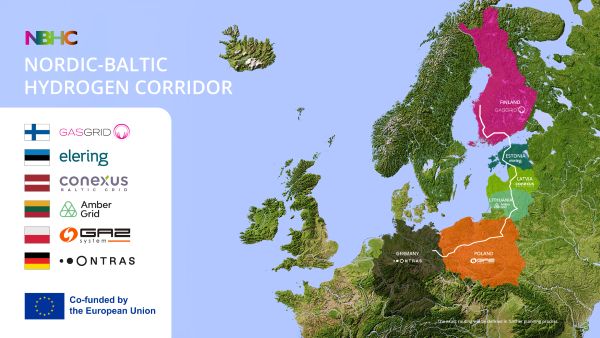The promoters of the Nordic Baltic Hydrogen Corridor (NBHC) project – Gasgrid Vetyverkot Oy from Finland, Elering from Estonia, Conexus Baltic Grid from Latvia, Amber Grid from Lithuania, GAZ-SYSTEM from Poland, ONTRAS Gastransport from Germany, and the European Climate, Infrastructure and Environment Executive Agency (CINEA)— formally signed a grant agreement on 1 July 2025, to secure financial support from the European Union (EU) for the initiative. This collaboration will foster a resilient and sustainable energy future within the Baltic Sea region.
The Corridor aims to facilitate the development of clean hydrogen markets while integrating them into Europe’s future energy landscape. The maximum grant amount of €6.8 million will support the feasibility phase of the NBHC. Additionally, co-financing from the Connecting Europe Facility (CEF) for cross-border energy infrastructure projects under the Trans-European Networks for Energy (TEN-E) will empower the NBHC project partners to conduct comprehensive feasibility studies. These studies will address the technical, economic, regulatory, and environmental considerations necessary for establishing a large-scale hydrogen pipeline network in the Baltic Sea area.
The NBHC represents a significant advancement toward realising the European hydrogen backbone—a strategic vision for interconnecting hydrogen production and consumption across the continent. By promoting renewable hydrogen transmission, this Corridor will enhance energy security and expedite Europe’s transition to a decarbonised economy.
Nemunas Biknius, head of Amber Grid, the Lithuanian gas transmission system operator, said the project aims to establish a robust hydrogen infrastructure that enhances energy security, promotes a connected European market, and supports clean energy production to decarbonise industry.
He highlighted that over the past 15 years, Amber Grid, in partnership with BEMIP, delivered successful natural gas projects that integrated the Baltic States and Finland into the EU energy market.
“This crucial CEF funding will facilitate project implementation and lead to tangible results,” emphasised the head of Amber Grid.
The feasibility study phase is anticipated to be completed in the first quarter of 2027, setting the foundation for subsequent project development phases, with commissioning expected around 2033.
As the feasibility phase progresses, stakeholders from both the public and private sectors will be invited to participate actively in the process to ensure the project considers local needs, environmental standards, and overarching strategic objectives.

